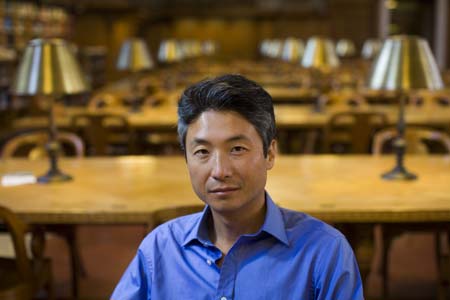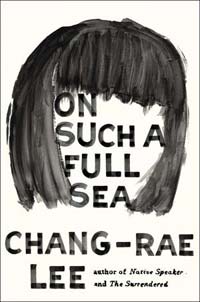- California Assembly OKs highest minimum wage in nation
- S. Korea unveils first graphic cigarette warnings
- US joins with South Korea, Japan in bid to deter North Korea
- LPGA golfer Chun In-gee finally back in action
- S. Korea won’t be top seed in final World Cup qualification round
- US men’s soccer misses 2nd straight Olympics
- US back on track in qualifying with 4-0 win over Guatemala
- High-intensity workout injuries spawn cottage industry
- CDC expands range of Zika mosquitoes into parts of Northeast
- Who knew? ‘The Walking Dead’ is helping families connect
Chang-rae Lee swaps realism for fantasy

Chang-rae Lee dips into dystopian fantasy in his new novel, “On Such a Full Sea. (Courtesy of Riverhead Books)
By Kim Young-jin
Readers often expect particular traits from prolific authors. This holds true for Chang-rae Lee, whose charm has been the measured, introspective study of narrators seen in novels “Native Speaker” and “Aloft.”
While his restrained prose and deft storytelling remain, it’s welcome that the Korean-American author departs from realism and dips into dystopian fantasy in “On Such a Full Sea,” released in Korea earlier this month. Where previously he immersed into the inner lives of marginalized narrators, Lee envisions a bleak future America, pressing fast-forward on some of the current problems plaguing the country.
The story begins in B-Mor, a self-contained, corporate-run community built where Baltimore once stood. Its inhabitants, whose ancestors came from an environmentally degraded land called “New China,” live sanitize
d lives, working in factories that supply goods for the upper strata of society, known as the “Charters.”
Their lives are far better than those in the “counties,” the archaic world of the lowest class.
It is in B-Mor where we meet Fan, a petite woman who works in the community’s immaculate fisheries. She’s content to be the best worker in her plant and spend her “free-day” in the underground arcades with her boyfriend Reg.
When Reg disappears, Fan leaves the confines of B-Mor to search for him, going first into the counties. She is taken in by Quig, an older man who leads a makeshift community and health clinic for the impoverished. Her search for Reg takes her to the cutthroat world of the Charters, giving readers a view of all three strata of society.
B-Mor is a society that’s becoming aware of its limits. “It’s not that we’re too fearful or comfortable, too cautious or reluctant, but that, as we have never experienced life outside these bounds…the reach of our thoughts have a ceiling,” we are told. The characterization echoes Lee’s past characters, who tend to be restrained and cover inner struggles with a stoic mask.
Creating a new world ― while staying relevant and believable ― is a tall task, requiring a deft weaving of its imagined history. Lee does this gamely, detailing the regimented, orderly system that rules the people of B-Mor (which is undermined by the surprising departure of Fan).
Perhaps because of the scope of this task, Lee utilizes the first-person plural. The “we” voice helps in taking a broader view of society; however, Lee loses some of the deep personal insight of his earlier work. Fan is plucky courageous, but we only see her from the outside. The need for explanation slows the prose down in some points, compared to the author’s earlier page turners.
Still, his lyricism and ability to juggle multiple storylines remains intact, and “Full Sea” provokes thought on society’s trajectory. Moreover, it’s an inspired risk by an established author, and one that could open imaginative doors in future works.













